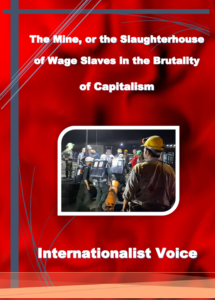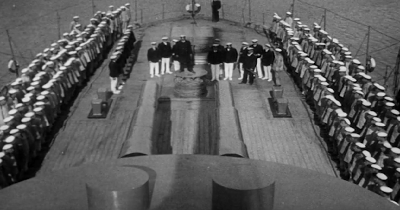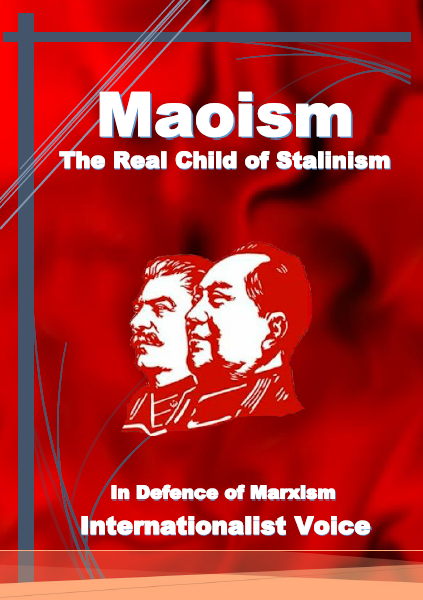The Mine, or the Slaughterhouse of Wage Slaves in the Brutality of Capitalism
Every 15 seconds, a wage slave somewhere on this planet falls to the ground. In no war is someone killed every 15 seconds, except in the class war. In one of the latest atrocities of the savage capitalist system, at around 9pm on the 21st September 2024 an explosion shook the Tabas coal mine and 51 miners, 51 wage slaves, 51 creators of human wealth, 51 breadwinners for their families became victims of capital’s greed. This deadly methane explosion and collapse 250 metres underground also left many more wage slaves injured. We share in the sorrow and grief of our fallen chained class brothers and extend our sympathies to their families.
Following this crime of the capitalist system, this time the wagons were not carrying coal, but the bodies of wage slaves – or fragments of their bodies. Wage slaves, with a lump in their throats or tears in their eyes, bid farewell to the corpses of their comrades. It was a heart-wrenching and painful scene including images of endless toil and lives lost. A mine that became a slaughterhouse. Every part of a destroyed body stands as testimony to the savagery of capitalism and the working conditions that, under the ruthless pursuit of profit, have turned into a living hell. A bitter scene that reveals the heavy price of human labour power, caught in the unfeeling machinery of the capitalist system.
In recent years, not only has the standard of living for workers declined, but their working conditions have also worsened, with workplace crimes (industrial accidents) being repeated one after another. In other words, capitalism has taken on the role of mass murder and is responsible for the massacre of millions of wage slaves who are killed in the workplace. Engels clearly explains this issue in his book The Condition of the Working Class in England.
“When one individual inflicts bodily injury upon another such injury that death results, we call the deed manslaughter; when the assailant knew in advance that the injury would be fatal, we call his deed murder. But when society places hundreds of proletarians in such a position that they inevitably meet a too early and an unnatural death, one which is quite as much a death by violence as that by the sword or bullet; when it deprives thousands of the necessaries of life, places them under conditions in which they cannot live – forces them, through the strong arm of the law, to remain in such conditions until that death ensues which is the inevitable consequence – knows that these thousands of victims must perish, and yet permits these conditions to remain, its deed is murder just as surely as the deed of the single individual; disguised, malicious murder, murder against which none can defend himself, which does not seem what it is, because no man sees the murderer, because the death of the victim seems a natural one, since the offence is more one of omission than of commission. But murder it remains.”[1]
The news of these massacres, that is, the daily deaths of wage slaves, only ever comes up in the midst of other incidents, if it makes the news at all. Even then, it is soon overshadowed by other stories. No one observes a moment of silence for them, no one’s emotions are stirred, no one shares the stories of their lives, they never trend on Twitter, no one’s neck veins bulge in outrage, no tyres are set alight in the streets, no cries for vengeance are heard, and they are certainly not discussed on social media. Why?
Isn’t this silence and indifference worth pondering? Every conscious worker, every communist, must not only observe this silence and indifference, they must also understand the class-based reasons behind it using their class awareness. These fallen workers are victims of the cruel capitalist system. Protesting these atrocities through class struggle will, in due course, challenge capitalism itself, whereas protests for democracy and against dictatorship merely question the political superstructure of the ruling system – that is, the disgraceful Islamic bourgeoisie. To spell it out: this silence and indifference is class-based.
Contrary to the deceitful rhetoric of both the right and left wings of capital, workplace crimes (industrial accidents) are not the result of employers’ carelessness or negligence, but are the product of the capitalist system itself. In this system, the aim of production is not to meet human needs, but to maximize profit. Workplace crimes (industrial accidents) are not just confined to the peripheral countries of capitalism, they are an inevitable feature of the inhumane capitalist system and are thus inseparable from it.
Workplace crimes (industrial accidents) demand a response from the workers’ class movement. There is no single saviour – the liberation of the workers can only be achieved by their own hands joined together. In their struggle, workers can rely solely on their class strength and the support of their fellow workers. Until the working class rises spontaneously and independently to defend its standard of living and the safety of its workplaces, we will not only continue to witness such atrocities but also see the further decline in the standard of living for the working class.
The Chained Workers!
Capitalism was born from filth, blood, and squalor, and the disgraceful history of capitalism is full of such atrocities. Capital’s insatiable thirst for profit knows no bounds. As long as wage slavery exists, as long as the capitalist system endures, we must continue to see our brothers and sisters being subjugated as the chained class. Expressing sympathy for the grief and sorrow of our fellow workers is only part of our duty. Our main duty is to fight against the system that legitimizes wage slavery and claims the lives of thousands every day. Workers across the globe have begun to stand tall and say no to austerity policies. The Iranian working class must, as a battalion of the global proletariat, march in step with the global struggle of its fellow workers. It is not through legislation or illusions about the bourgeois judicial system, but only through class struggle that we can defend the standard of living and workplace safety, minimize workplace crimes (industrial accidents), and in due course, challenge capitalism itself.
The future belongs to the class struggle!
F.A.
22 September 2024
Notes:
[1] Condition of the Working Class in England – page 84
Download As PDF















